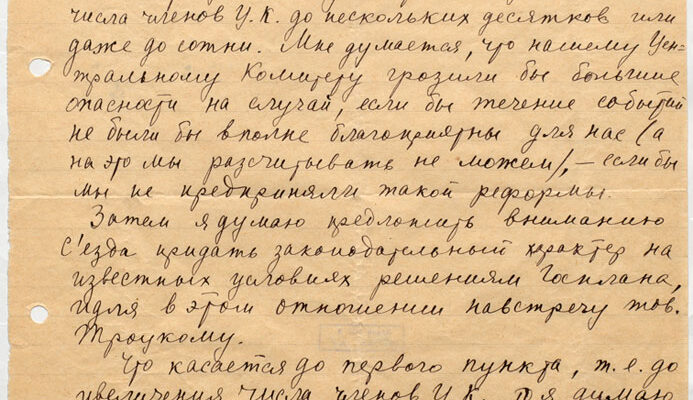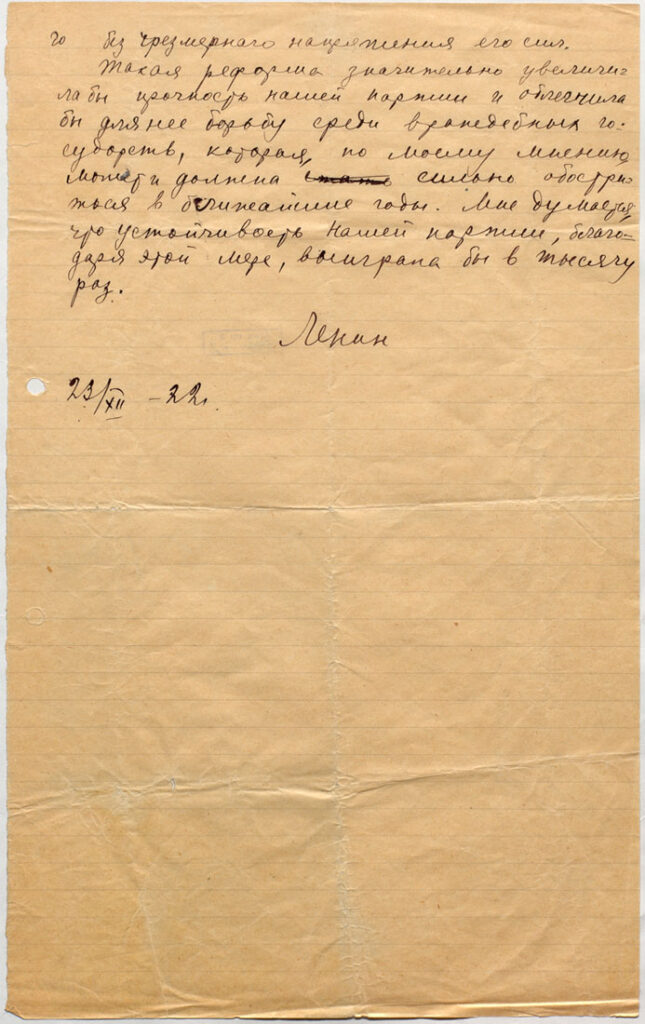
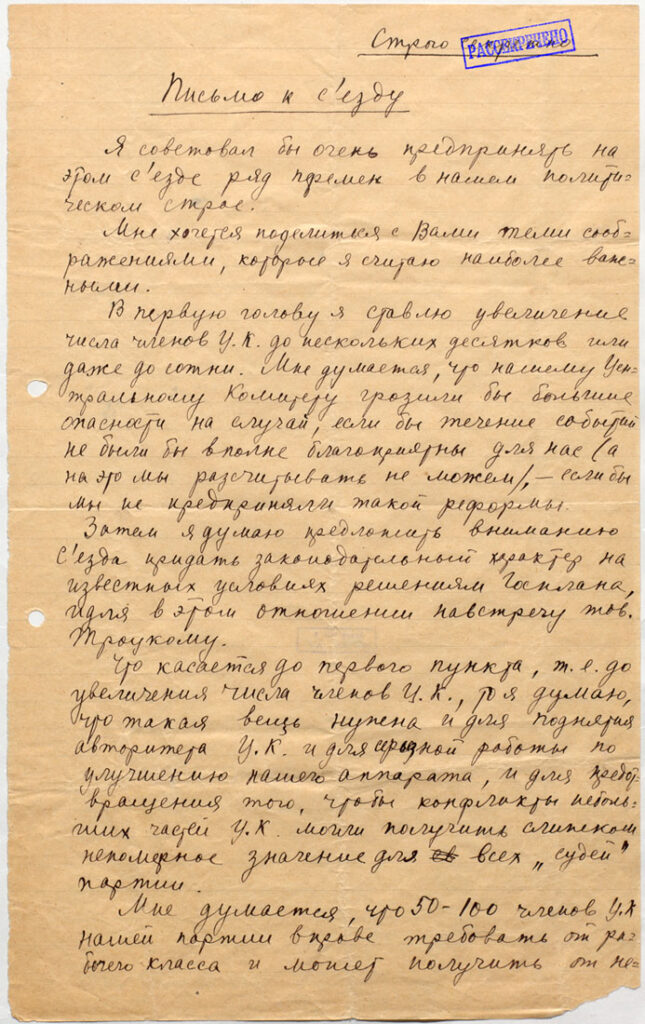
Letter to the Congress I
I would urge strongly that at this Congress a number of changes be made in our political structure.
I want to tell you of the considerations to which I attach most importance.
At the head of the list I set an increase in the number of Central Committee1The Central Committee was the leading governmental body of the Soviet Union members to a few dozen or even a hundred. It is my opinion that without this reform our Central Committee would be in great danger if the course of events were not quite favourable for us (and that is something we cannot count on).
Then, I intend to propose that the Congress should on certain conditions invest the decisions of the State Planning Commission2The State Planning Commission, also known as Gosplan, was in charge of the economy of the Soviet Union with legislative force, meeting, in this respect, the wishes of Comrade Trotsky3Leon Trotsky (1879-1940) was a prominent member of the Communist Party who opposed Joseph Stalin. He would be assassinated by Ramón Mercader in Mexico City under the order of Stalin– to a certain extent and on certain conditions.
As for the first point, i.e., increasing the number of C.C.4Central Committee members, I think it must be done in order to raise the prestige of the Central Committee, to do a thorough job of improving our administrative machinery and to prevent conflicts between small sections of the C.C. from acquiring excessive importance for the future of the Party.
It seems to me that our Party has every right to demand from the working class 50 to 100 C.C. members, and that it could get them from it without unduly taxing the resources of that class.
Such a reform would considerably increase the stability of our Party and ease its struggle in the encirclement of hostile states, which, in my opinion, is likely to, and must, become much more acute in the next few years. I think that the stability of our Party would gain a thousand-fold by such measure.
Lenin
December 23, 1922
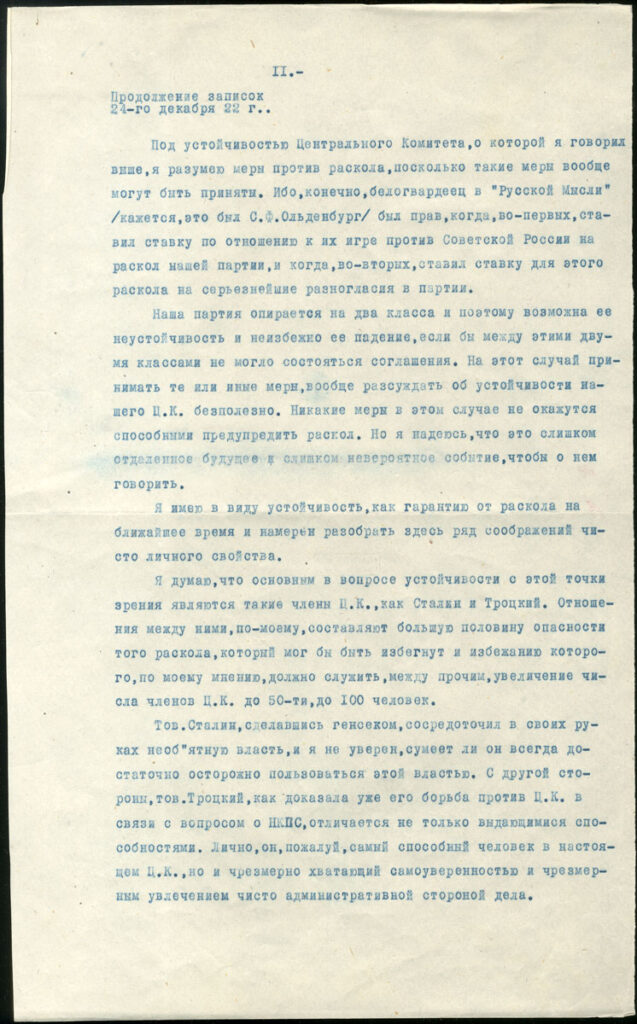
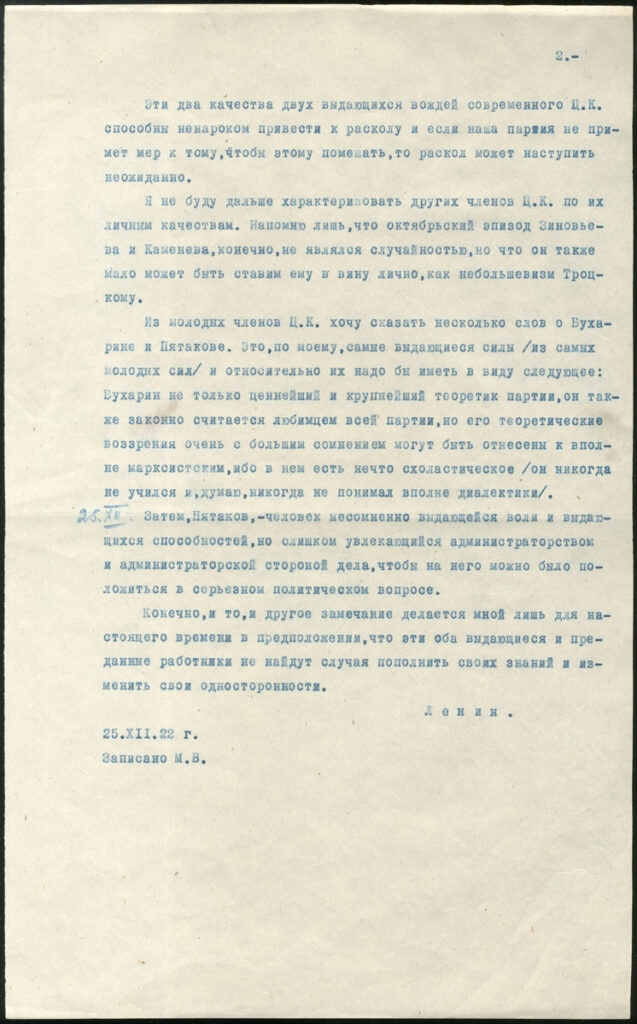
Letter to the Congress II
Continuation of the notes.
December 24, 1922
By stability of the Central Committee, of which I spoke above, I mean measure against a split, as far as such measures can at all be taken. For, of course, the whiteguard5The Whites were a loose organization of anti-communists in Russkaya Mysl6Russkaya Mysl was a popular Russian magazine that opposed the Communists. It was shut down in 1927 (it seems to have been S.S. Oldenburg7Sergey (Sergei) Oldenburg (1863-1934) was a Russian journalist and academic who served as Secretary of the Russian Academy of Sciences from 1905 to 1929) was right when, first, in the whiteguards’ game against Soviet Russia he banked on a split in our Party, and when, secondly, he banked on grave differences in our Party to cause that split.
Our Party relies on two classes and therefore its instability would be possible and its downfall inevitable if there were no agreement between those two classes. In that event this or that measure, and generally all talk about the stability of our C.C., would be futile. No measure of any kind could prevent a split in such a case. But I hope that this is too remote a future and too improbable an event to talk about.
I have in mind stability as a guarantee against a split in the immediate future, and I intend to deal here with a few ideas concerning personal qualities.
I think that from this standpoint the prime factors in the question of stability are such members of the C.C. as Stalin and Trotsky. I think relations between them make up the greater part of the danger of a split, which could be avoided, and this purpose, in my opinion, would be served, among other things, by increasing the number of C.C. members to 50 or 100.
Comrade Stalin, having become Secretary-General8April 3, 1922 – October 16, 1952, has unlimited authority concentrated in his hands, and I am not sure whether he will always be capable of using that authority with sufficient caution. Comrade Trotsky, on the other hand, as his struggle against the C.C. on the question of the People’s Commissariat of Communications has already proved, is distinguished not only by outstanding ability. He is personally perhaps the most capable man in the present C.C., but he has displayed excessive self-assurance and shown excessive preoccupation with the purely administrative side of the work.
These two qualities of the two outstanding leaders of the present C.C. can inadvertently lead to a split, and if our Party does not take steps to avert this, the split may come unexpectedly.
I shall not give any further appraisals of the personal qualities of other members of the C.C. I shall just recall that the October episode with Zinoviev and Kamenev9Grigory Zinoviev (1883-1936) and Lev Kamenev (1883-1936) were prominent members of the communist party who wrote a statement in the newspaper Novaya Zhizn attacking an unpublished decision of the Central Committee [See Vol. 26, pp. 216-19] was, of course, no accident, but neither can the blame for it be laid upon them personally, any more than non-Bolshevism can upon Trotsky.
Speaking of the young C.C. members, I wish to say a few words about Bukharin10Nikolai Bukharin (1888-1938) was a prominent member of the Communist party who was aligned with Trotsky. He was executed by Stalin in 1938 and Pyatakov11Georgy Pyatakov (1890-1937) was a prominent member of the Communist party who was aligned with Trotsky. He was executed by Stalin in 1937. They are, in my opinion, the most outstanding figures (among the youngest ones), and the following must be borne in mind about them: Bukharin is not only a most valuable and major theorist of the Party; he is also rightly considered the favourite of the whole Party, but his theoretical views can be classified as fully Marxist only with great reserve, for there is something scholastic about him (he has never made a study of the dialectics, and, I think, never fully understood it).
December 25. As for Pyatakov, he is unquestionably a man of outstanding will and outstanding ability, but shows too much zeal for administrating and the administrative side of the work to be relied upon in a serious political matter.
Both of these remarks, of course, are made only for the present, on the assumption that both these outstanding and devoted Party workers fail to find an occasion to enhance their knowledge and amend their one-sidedness.
Lenin
December 25, 1922
Bibliography
“Письмо В.И. Ленина к съезду о сохранении единства партии, создании устойчивого ЦК, способного предотвратить раскол партии, с характеристикой некоторых членов ЦК (И.В. Сталина, Л.Д. Троцкого, Н.И. Бухарина, Г.Л. Пятакова, Г.Е. Зиновьева, Л.Б. Каменева), пр: Ленин.” Главная. Accessed May 03, 2021. http://lenin.rusarchives.ru/dokumenty/pismo-vi-lenina-k-sezdu-o-sohranenii-edinstva-partii-sozdanii-ustoychivogo-ck-sposobnogo.

Michael Kilduff is a history major at Ramapo College of New Jersey. He is looking to become a high school history teacher after going to graduate school for history education.

